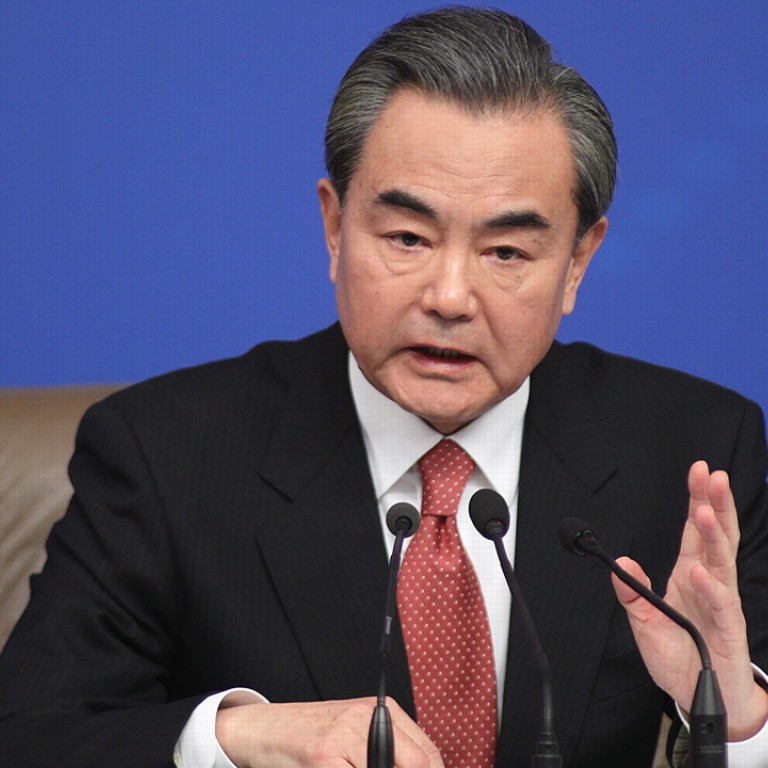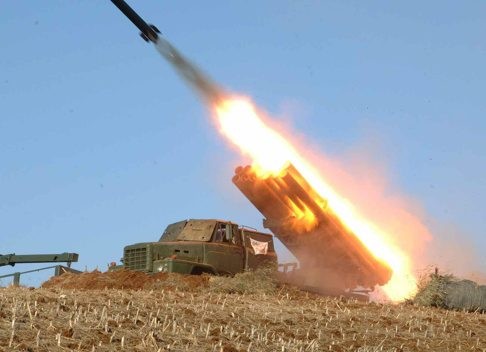
New | Tough questions, straight answers: China’s top diplomat on the South China Sea, North Korea, Japan, the US and more
Will China allow the media to visit the disputed South China Sea islands? Is wayward North Korea still an ally? Will Beijing further expand its interests abroad?
Chinese Foreign Minister Wang Yi addressed the sensitive issues at his annual press conference, which took place on the sidelines of the National People’s Congress in Beijing on Tuesday morning.
We give you the highlights.
North Korea
“The confrontation in the Korean Peninsula is tense and full of the smell of ‘gunpowder’… China will not watch its own security interests being damaged for no reason.”
China will not sit by and watch the stability of the Korean Peninsula being disrupted, Wang said.
Beijing will also not compromise its stance on the denuclearisation of the region, he said.
“We stand firm on the denuclearisation path of the Korean Peninsula and will not tolerate any nuclear or missile plan that North Korea advances,” Wang said.
“The confrontation in the Korean Peninsula is tense and full of the smell of ‘gunpowder’. It would be a disaster for all parties if the tension intensified or got out of control.

READ MORE: North Korean nuclear weapons ‘on standby’ after sanctions, while US and South mull missile deployment
“As the peninsula’s biggest neighbour, China will not watch its stability being sabotaged or China’s own security interests being damaged for no reason.
“We strongly urge all parties to maintain sensible restraint and not further aggravate the conflict.”
Wang did not directly answer questions on whether China and North Korea remained allies or if there would be another Korean war.
Rather, he described the two as having “normal nation-to-nation relations with a profound friendship”.
The foreign minister reiterated China’s support for the long-stalled six-party talks to find a peaceful resolution over North Korea’s nuclear weapons programme
Beijing was open to all initiatives, even if it involved fewer parties, as long as it could bring Pyongyang back to the negotiating table, he said.
South China Sea
“China will not allow ... anyone to muddle the South China Sea and cause chaos in Asia.”
China will not allow anyone to cause chaos in the South China Sea, Wang said.
As the biggest coastal country along the South China Sea, Beijing wished to uphold freedom of navigation in the region but that did not mean the freedom to do anything any country wanted, he warned.
“China will not allow – nor would most countries in the region – allow anyone to muddle the South China Sea and cause chaos in Asia,” Wang said.
READ MORE: China enlists fishermen’s help to protect maritime rights in disputed South China Sea
The foreign minister shrugged off accusations that Beijing was militarising the South China Sea.
“China cannot be accused of militarisation. This label suits other countries better,” Wang said, without making direct reference to the United States.
Beijing was merely building necessary defence and civil facilities on the Spratly Islands, he said.
Beijing’s efforts to set up emergency maritime hotlines in the region had been “obstructed by certain individual countries” and that was why people saw little progress, he added.
Wang said China would not rule out taking journalists to the disputed islands after its infrastructure facilities were completed.
China’s overseas interests
“We are willing to try to build some necessary infrastructure and support facilities in the regions of Chinese interests.”
China will take more active measures to protect its growing interests overseas, Wang said.
Millions of Chinese nationals live abroad, more than 30,000 Chinese companies have offshore offices, and China’s overseas assets in stock amount to several trillions of US dollars.
The massive scale of China’s interests overseas required Beijing’s effective protection, the foreign minister said.
“It is a pressing task for China’s diplomacy,” Wang said.
On top of existing anti-pirate naval fleet escorts in the Aden Gulf and contributions of funds and personnel to UN peacekeeping missions, China would take up more international security obligations, Wang said.
READ MORE: Chinese tycoon eyes huge potential for mainland companies in Africa
Asked about the setting up China’s first overseas naval base in Horn of Africa country Djibouti, Wang said the move was “reasonable, logical and compatible with international norms”.
“We are willing to try to build some necessary infrastructure and support facilities in the regions of Chinese interests,” he said.
China would take part in more law enforcement and security cooperation programmes and constructively participate in resolving international and regional issues politically, Wang said.
But it would not seek hegemony or expand as traditional powers did, he added.
United States
“I believe that the two countries can think over how to develop cooperation in the South China Sea after the US truly calms down.”
China and the United States could consider maritime cooperation when “the US truly calms down”, Wang said.
Frictions between the two sides had increased of late because of disputes in the South China Sea, he said, but Beijing remained hopeful as previous disputes over internet security were eased after a dialogue was set up between the two countries.
“Recently, there has been growing friction [between China and the US] because of maritime disputes [over the South China Sea]. But I believe that the two countries can think over how to develop cooperation in the South China Sea after the US truly calms down.” Wang said.
READ MORE: ZTE faces US export restrictions over Iran surveillance system deal
The foreign minister also slammed US sanctions over ZTE, China’s largest listed telecommunications manufacturer, as a move that “causes harm to itself and others”.
Both sides should face their differences and find ways to resolve their problems, such as through the two nations’ cooperation in last year’s Paris climate talks, he said.
Wang added that the root of the tension lay in Washington’s suspicions about Beijing’s intentions and worries that China would one day replace the US.
“China is not the US and China will never become another US. We have no intention of replacing any other country as a leader of others,” he said.
Japan
“Japan should think hard and think it through whether to treat China as friend or foe, partner or opponent.”
The outlook for Sino-Japanese relations offered no optimism although there had been signs of improvement, Wang said.
Ties with Tokyo had been badly damaged because of Japanese leaders’ “double-faced” behaviour in claiming to be trying to improve relations while at the same time continuing to cause trouble for Beijing, the foreign minister said..
“As far as the China-Japan relationship goes, the root cause of the [strained ties] lies in Japanese leaders’ wrong perception of China,” Wang said.
“Japan should think hard and think it through whether to treat China as friend or foe, partner or opponent.”
READ MORE: China, Japan mull restarting ministerial talks on economic affairs after 5 ½-year gap, says report
Sino-Japanese ties have been frosty since 2012 when Tokyo chose to nationalise the disputed Diaoyu Islands in the East China Sea, which are administered by Japan but claimed by China.
High-level diplomatic talks between the two countries almost came to a standstill and Beijing called off a proposed visit by Japanese Foreign Minister Fumio Kishida.



